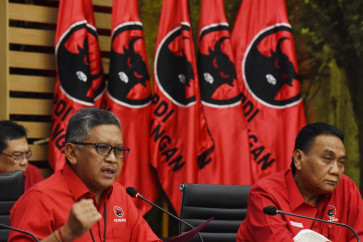Analysis: Indonesian plantation sector: Helpless
On the back of plunging oil prices, we believe crude palm oil (CPO) prices will be helpless, unable to decouple from the downtrend of petroleum prices
Change Size

O
n the back of plunging oil prices, we believe crude palm oil (CPO) prices will be helpless, unable to decouple from the downtrend of petroleum prices. This is particularly true given the country's recent decision to move away from fuel subsidies, which will spell bad news for the Indonesian government's biodiesel program.
Looking ahead, we believe there will be an adverse impact on CPO demand in 2015, as Indonesia's biodiesel program was expected to absorb around 3 million tons, or around 10 percent of Indonesia's total CPO production next year. In addition, biodiesel demand from other countries could also decline on the back of current depressed oil prices.
Thus, going forward, despite limited production growth of 2.4 percent year on year (y-o-y) to 169 million tons based on USDA forecast, vegetable oil inventories could spike on possible lower demand from worldwide biodiesel programs, which currently account for around 14 percent of total global demand for vegetable oils. Note that the CPO price is currently trading at a lower discount to soy oil, compared to historical levels of discount (table 2), suggesting a downside for CPO pricing ahead.
On the CPO supply disruption potential, we see risks continuing to fade as shown by the Southern Oscillation Index (SOI) with value unsustainable at below minus eight, suggesting a low probability of weather disruptions ahead. Furthermore, the Predictive Ocean Atmosphere Model for Australia (POAMA) indicates a low El Nino probability. Despite dry weather in the fourth quarter, this year, we believe that CPO production in major areas of Malaysia and Indonesia will remain solid.
Factoring in the recent CPO price weakness, we cut our 2014 Rotterdam price estimate from US$831/ton to $821/ton, down 3 percent y-o-y (Malaysia: Malaysian ringgit (MYR) 2,400 per ton). In 2015, we lower from $866/ton (up 4 percent y-o-y) to $725/ton, down 12 percent y-o-y (Malaysia: MYR 2,150/ton). However, the net impact on domestic CPO players should be less as export tax is currently zero for Rotterdam CPO prices below $750/ton. We also raise our local currency expectation to Rp 11,500 per US dollar for 2015 and to Rp 11,200 per dollar for 2016 on improving current account deficits. As such, we lower our 2015 and 2016 forecast for earnings by around 17 -37 percent.
Given the significant impact of a weak crude oil price outlook on CPO price expectations (table 3), we now have an underweight recommendation for investors with no buy rating on all the stocks under our coverage. Risks to our call are a stronger US dollar, higher CPO prices and lower fertilizer costs, which would help the performance of the sector.
________________
The writer is a senior research manager at the research department of Bahana Securities









